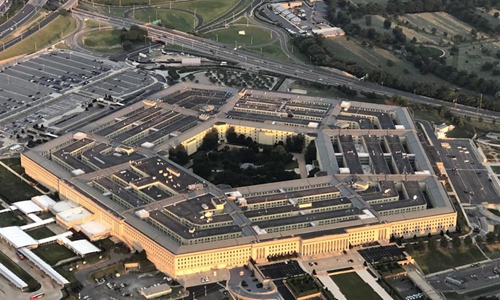HOME >> OPINION
US attempt to rope China into New START negotiations won't succeed
By Cheng Hanping Source:Global Times Published: 2020/2/12 20:28:41

File photo shows the Pentagon seen from an airplane over Washington DC, the US. Photo:Xinhua
US National Security Adviser Robert O'Brien said on February 5 that the US and Russia would "start negotiations soon on arms control, on the nuclear issue." As the two powers face next year's deadline to extend the Strategic Arms Reduction Treaty (New START) - the last remaining agreement binding their nuclear arsenals - the international community hopes that the pact could be renewed.
The US formally withdrew from the Intermediate-Range Nuclear Forces (INF) Treaty in August 2019 disregarding opposition from home and abroad. Why has the US suddenly changed its usual behavior and offered to negotiate with Russia on the New START?
First, the US is attempting to claim the moral high ground. Since withdrawing from the INF Treaty, the Trump administration has been questioned and slammed both inside and outside the US. It is widely believed that this irresponsible decision by the US will lead to a more dangerous world.
The US' current move is clearly designed to rebuild its image. By taking the initiative to start negotiations, the Trump administration can shape itself as a peacekeeper and win more support during the election campaign, especially from peace-loving voters.
Second, the US is paving the way for buck-passing. Russian Foreign Minister Sergei Lavrov visited the US in December 2019, where he stated that Moscow was ready to extend the New START as soon as possible. O'Brien's February statement can be seen as a formal response. On the one hand, it shows US goodwill, but on the other, it may serve as an excuse once their negotiations break down. Washington's unspoken words might be: The US agreed to talk, thus it's not our fault if the negotiations fail. But if the US refused to even begin talks, it would certainly be universally condemned.
Third, the US hopes to take this opportunity to rope China into a new pact. Many US officials inside the Trump administration have suggested negotiating a new treaty that includes China, and perhaps other countries. Adding China to negotiations over limiting strategic weapons is their true purpose.
The US attempt to bring China into trilateral negotiations aims to restrict and weaken China's strategic deterrence. From the perspective of the officials in the Trump administration who are stuck in a Cold-War mentality, China's future military development is seen as more threatening to the US than Russia. Therefore, the US believes China's development must be effectively contained.
The US is also attempting to get Russia's endorsement to include China into new negotiations, which is a tactic aimed at driving a wedge between Beijing and Moscow and jeopardizing their comprehensive strategic partnership of coordination.
If China categorically refuses to participate in the arms control negotiations, the US will have another excuse to let the talks fail and will attempt to blame China.
China has expressed no interest in participating in any trilateral arms control negotiations, and noted that its arsenal is one-fifth the size of Washington's and Moscow's. Russian Foreign Minister Sergey Lavrov made it clear, "Washington is evading any serious discussion, making public discouraging signals regarding the future of this treaty. It's an open provocation to insist on China's participation in the process, as a precondition, despite Beijing's clearly stated and many times repeated position on this."
The New START was signed in 2010 and is due to expire in 2021. It limits the number of deployed strategic nuclear warheads to 1,550, a two-thirds reduction from the original START, signed in 1991. There is not much time left before the New START expires. Some scholars in the US believe that the Trump administration is unlikely to reach any agreement with Russia before the presidential election and Trump's focus will be on seeking reelection.
In addition, the US has never publicly promised to extend the agreement, and has never offered a plan on extending it. The Trump administration is seemingly not ready to prolong the treaty.
The real intentions of the US to start arms control talks are to break the existing system of arms control and the current strategic balance of nuclear powers, as it seeks to become the only strategic superpower in the world. The future of the New START is hence gloomy. Once the US withdraws, the world will become far less secure.
The author is senior research fellow and professor at the Collaborative Innovation Center of South China Sea Studies, Nanjing University. opinion@globaltimes.com.cn
Posted in: VIEWPOINT